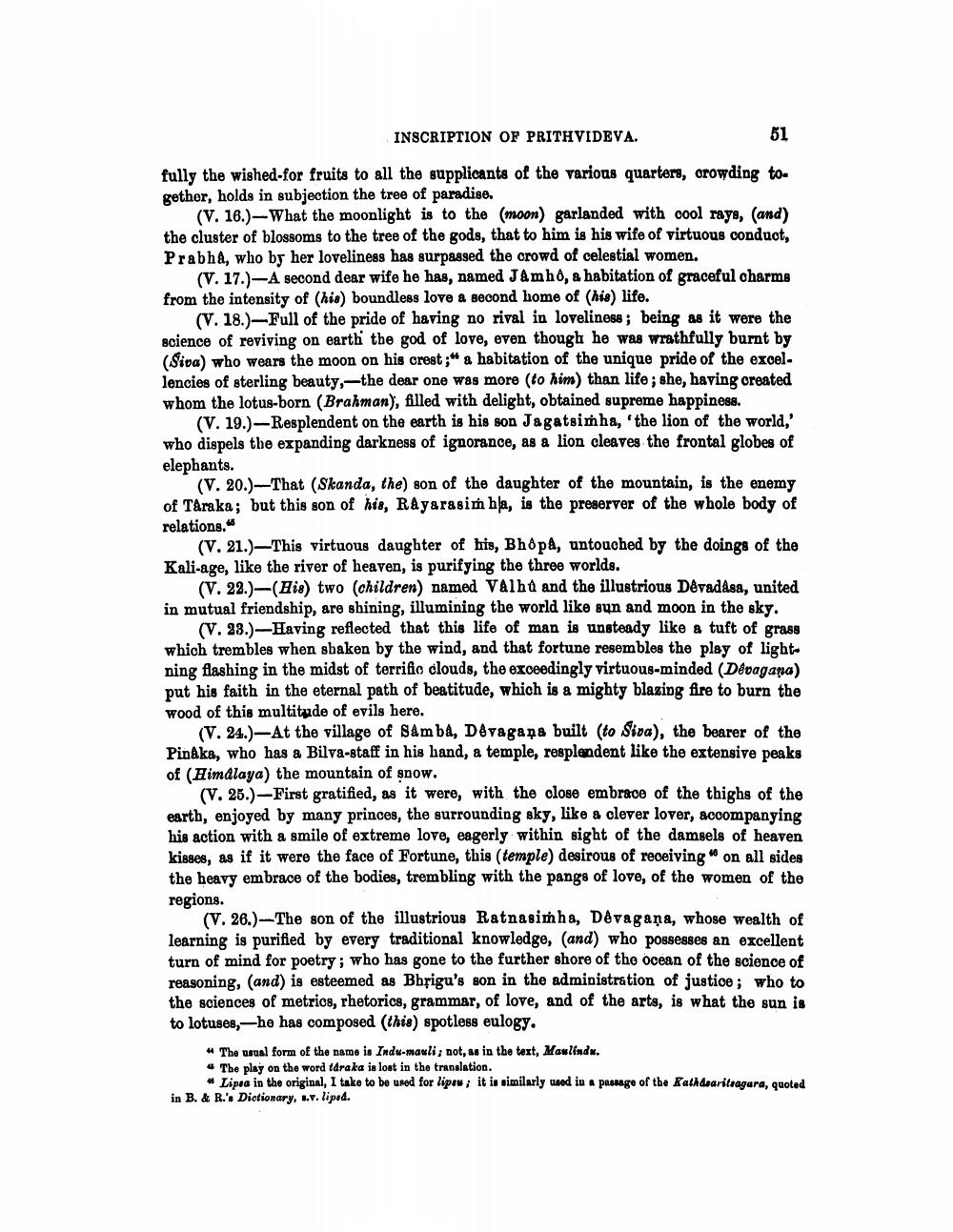________________
INSCRIPTION OF PRITHVIDEVA.
fully the wished-for fruits to all the supplicants of the various quarters, crowding together, holds in subjection the tree of paradise.
(V. 16.)-What the moonlight is to the (moon) garlanded with cool rays, (and) the cluster of blossoms to the tree of the gods, that to him is his wife of virtuous conduct, Prabha, who by her loveliness has surpassed the crowd of celestial women.
(V. 17.)- A second dear wife he has, named Jamh0, a habitation of graceful charms from the intensity of (his) boundless love a second home of (hie) life.
(V. 18.)-Full of the pride of having no rival in loveliness; being as it were the science of reviving on earth the god of love, even though he was wrathfully burnt by (Siva) who wears the moon on his crest;" a habitation of the unique pride of the excel. lencies of sterling beauty,—the dear one was more (to him) than life; she, having created whom the lotus-born (Brahman), filled with delight, obtained supreme happiness.
(V. 19.)-Resplendent on the earth is his son Jagatsimha, 'the lion of the world,' who dispels the expanding darkness of ignorance, as a lion cleaves the frontal globes of elephants.
(V. 20.)-That (Skanda, the) son of the daughter of the mountain, is the enemy of Taraka; but this son of his, Rayarasim hla, is the preserver of the whole body of relations.
(V. 21.)-This virtuous daughter of his, Bhopa, untouched by the doings of the Kali-age, like the river of heaven, is purifying the three worlds.
(V. 22.)-(His) two (children) named Valhů and the illustrious DévadAsa, united in mutual friendship, are shining, illumining the world like sun and moon in the sky.
(V. 23.)-Having reflected that this life of man is unsteady like a tuft of grass which trembles when shaken by the wind, and that fortune resembles the play of lightning flashing in the midst of terrific clouds, the exceedingly virtuous-minded (Dévagana) put his faith in the eternal path of beatitude, which is a mighty blazing fire to burn the wood of this multitude of evils here.
(V. 24.)-At the village of Samba, Dévagana built (to Siva), the bearer of the Pinaka, who has a Bilva-staff in his hand, a temple, resplendent like the extensive peaks of (Himalaya) the mountain of snow.
(V. 25.)-First gratified, as it were, with the close embrace of the thighs of the earth, enjoyed by many princes, the surrounding sky, like a clever lover, accompanying his action with a smile of extreme love, eagerly within sight of the damsels of heaven kisses, as if it were the face of Fortune, this temple) desirous of receiving on all sides the heavy embrace of the bodies, trembling with the pangs of love, of the women of the regions.
(V. 26.) --The son of the illustrious Ratnasimha, Dévagana, whose wealth of learning is purified by every traditional knowledge, (and) who possesses an excellent turn of mind for poetry; who has gone to the further shore of the ocean of the science of reasoning, (and) is esteemed as Bhrigu's son in the administration of justice; who to the sciences of metrios, rhetorics, grammar, of love, and of the arts, is what the sun is to lotuses, he has composed (this) spotless eulogy.
- The usual form of the name is Indu-mauli; not, as in the text, Mawlindu. • The play on the word idraka is lost in the translation.
Lipia in the original, I take to be used for lipes; it is similarly wed in a passage of the Rath doaritsagara, quoted in B. & R.'s Dictionary, s.v. lipd.




